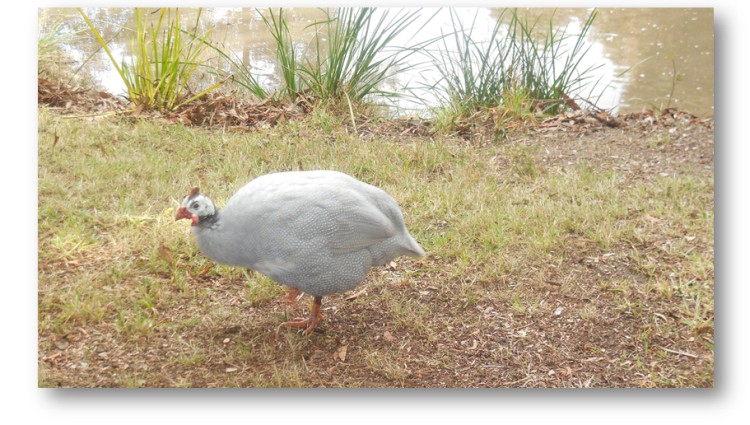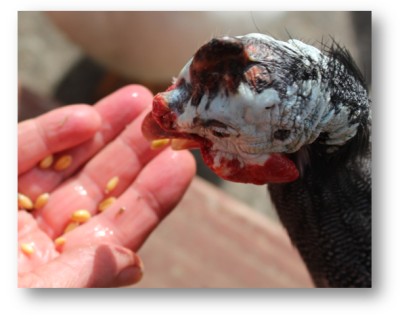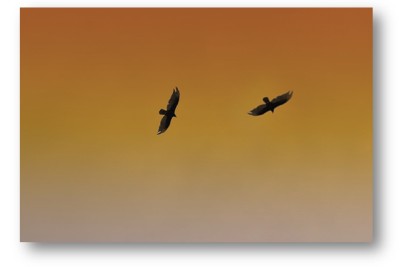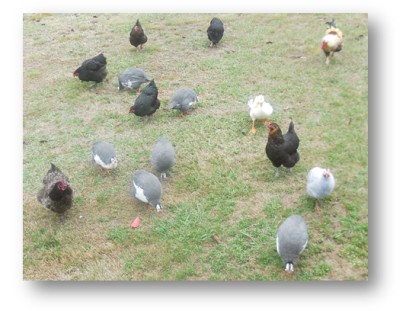
 Want to know what it’s really like to care for these unique birds and have them running around on your own property?
Want to know what it’s really like to care for these unique birds and have them running around on your own property?
Care Guinea Fowl Facts – Part 3 brings to you stories to help you understand how unique these birds really are. They’re fun and very entertaining.
- How to Raise Guinea Fowl Keets (up to 8 weeks old)
- Care for Guinea Fowl Facts – Part 2 (facts and features)
- Care for Guinea Fowl Facts – Part 3 (facts and stories) – this page!
I’ve given many facts about Guinea Fowl in general, but now I’d like to share some entertaining stories with you:
Help! Come and Get Me!
This morning my husband and I were in the lounge having a cuppa. As we were relaxing, we could hear the keets chortling… loudly. I mentioned to Selwyn how they really only make that kind of a noise when there is something wrong, so I went outside to investigate.
I saw the problem almost immediately. Two of them were outside the fence, and crying to come back in with the others.
The other 5 keets were all chortling in alarm. Three of them were up on our verandah railing, while the other 2 were running around most agitated. I’m quite sure they were calling for us to come and rescue the two that were outside.
Now, these keets have all 3.5 acres to roam on… and they use it all, although they have their favourite places. But, sometimes when they are alarmed they take to the wing as a group, chortling in alarm as they go. The problem is this… when they’re on the ground they recognise the fence as the boundary of their territory, and for them to be outside of that area is unfamiliar and very scary. The boundary fences are certainly not bird proof at all as we only have normal farm fences, say 1 metre high, that’s all.
You need to understand that Keets are perfect flyers. They were flying by 2 weeks of age, and have the ability to fly wherever they want… and as high as they want. They have decent wings for the size of them, and even when they give their wings a flap, like stretching, they lift off the ground. It would be so easy for them to go up, up and away into the wild blue yonder… but they don’t want to. They know where home is and that’s where they want to be.
But, when they become alarmed and take to the air, from there they don’t recognise the fence line… it’s confusing. As they land, some of them can mistakenly land on the other side of the fence. This doesn’t happen very often, but it’s happened a few times.
Once on the other side, they run up and down calling out and peering through the fence as they can’t work out how to get back again. They so easily flew over, but once on the ground they look through the fence and have no idea how to get back over it. Hmm… what’s that I hear about “bird brain”?
So I grabbed a broom and went over to help them back inside. I use the broom like a long arm to stop them running up and down. Usually when I close in on them they fly up the fence and over… as simple as that.
But this morning I managed to get one of them to go back over this way, while the other one was a bit more obstinate. I chased him up and down until finally he ran around the front and came back in via our gate. I think it was the same bird I have trouble with most nights when I’m putting them to bed, as there is one bird who just runs here and there and won’t go in the pen. If I close the gate to the pen he complains… “Oh I can’t get in!” So I open it and he says, “I’m not going in there!”
I think he enjoys being a challenge – you know – there has to be one in the group! All the others go straight in as they want their dinner.
Keets are very fast runners. They remind me of the Roadrunner! Actually they look like mini emus when they run with their head held high and very upright.
Once I read online where someone said that once the keets reach 6 months old, if they give their alarm call (this is what I call chortling), you can virtually guarantee there is something wrong. I’ve found this to be pretty true, although some seem to be a false alarm. Hard to tell because sometimes you have no idea what got them going.
Hawk! Alert everyone, Hawk!
 About a week ago, Selwyn and I just happened to be sitting on the deck, once again cuppa in hand. The keets and chooks were all under the deck where they sometimes like to indulge in a dust bath in the dry soil.
About a week ago, Selwyn and I just happened to be sitting on the deck, once again cuppa in hand. The keets and chooks were all under the deck where they sometimes like to indulge in a dust bath in the dry soil.
As they were bathing and preening themselves, they were chirping quietly to each other, I happened to mention how much I loved to hear that gentle contented sound they make… when all of a sudden, one of them ran out and began to chortle.
Next they were all out, chortling loudly.
Knowing there is usually a jolly good reason for this we looked around and then to the sky. Sure enough there were 2 hawks circling high above. The keets were most upset about this, but rather than stay nice and quiet under the deck and therefore in safety, they ran out into the open to challenge the hawks.
Eventually the hawks gave up as I guess they saw us staring up at them too, so off they went.
Who’s that? Go away! Go Away!
Another day, our next door neighbour’s young girl was nearby our dividing fence and calling out to her mother. This was unusual as it’s normally pretty quiet over there. The keets immediately ran to the line of trees on our side of the fence and chortled loudly at the girl. She responded by clapping her hands and calling to them to be quiet. They only chortled louder! She eventually went away, so they stopped. Peace reigned!
What are you doing? What’s all that noise?
You really can do anything you like on the property and it won’t upset the keets. They are quite happy with noisy motors such as the ride-on mower. It doesn’t bother them AT ALL! Too much so, in fact. Instead of running from it, they will often run over wanting to know what you are doing, and why. This habit of theirs is a little annoying with the cars. As there is nothing to stop them from getting on the driveway, we always have to make sure they are out of the way when taking the car out. They have no road sense. They seem to have complete faith that you wouldn’t do anything to hurt them and are not afraid of any “normal sounds”.
xxx
A short version of the ‘Chortle”
Watch dogs!
In fact, they are interested in everything and seem to be afraid of very little. There is a laneway down one side of our property and we’ve observed that when people walk down it, especially if they have a dog, the keets will run up to the fence and chortle loudly at them. It’s like they are prepared to challenge everything.
Hard Workers – a foraging we will go!
 One of the reasons I wanted to have these birds was because I had read they were marvellous for keeping down insects, ticks and even snakes. Now I liked that! Here in Tasmania we have only 3 kinds of snakes… all of them poisonous.
One of the reasons I wanted to have these birds was because I had read they were marvellous for keeping down insects, ticks and even snakes. Now I liked that! Here in Tasmania we have only 3 kinds of snakes… all of them poisonous.
Apparently these brave little birds will challenge a snake and drive it off the property. In fact, I’ve even heard that if they can corner it they will kill it. They do this by using their numbers against the snake, as they work as a group. But thankfully, to this day I’ve not seen a snake around anywhere and would like to think that will continue.
The keets will scratch around a bit in the garden but we’ve found the main reason to be to have a nice dust bath. They love that with a passion! But the soil has to be dry and powdery to attract that type of attention.
They spend all day grazing on the grass and looking for tasty treats, so much so that it’s not totally necessary to feed them any additional feed. We do though, not a lot… but just something to look forward to and encourage them back into the enclosure to roost.
Wild Birds at Heart – Don’t Fence Me In!
These birds originated in South Africa and are still in essence a wild bird. They’ve not been bred and ‘improved’ in the same way chooks (chickens) have and to all intents and purposes the keets are still wild. But I have tamed them to a degree… not as much as I would have liked to but I didn’t handle them sufficiently enough when they were growing up. Never-the-less they like to follow me wherever I go and are always curious little creatures about everything I’m doing.
If you wanted to own your own Guinea Fowl you would need to live in an area where the neighbours don’t complain about the noise. Fortunately our neighbours are far enough away and we have no problem that way. But they’re country folk around here so I don’t expect there would be too much problem… but you never know.
Apart from that they are wonderful, curious, fun to watch birds who are out there doing a good job on our property, keeping insects and whatever at bay. I wouldn’t like to be without them. They provide us with endless entertainment and really are quite unique little creatures.
I hope you’ve enjoyed this post – Care Guinea Fowl Facts – Part 3, and that you’ve learned much valuable information. Don’t forget to leave me with a comment or of-course, if you have any questions you’d like to ask, don’t hesitate. I will come back to you.
Warm regards,

Marilyn Williams
![]()







Hi Marilyn,
What a lovely story about your pets. They sound like a very amusing bunch, a bunch that you wouldn’t do without I’m sure! Does Tasmania get bad winters? How do the Guinea Fowl cope when it gets cold? Thankfully we don’t have any snakes where I live but I’d definitely be getting some animals in to keep us safe if we did!!!
Sammi
Hi Sammi! I’m so sorry to be so long with my reply, I’ve had circumstances that have taken me away from my computer for some time.
Yes, I’m very fond of my guineas and learning from them all the time. Our winters are not “bad” in that we don’t get snow. We do get quite a few frosts though. The guineas are tucked up in their little beds each night and huddle closely together so I’m sure they are fine.
Imagine having no snakes! We have only 3 different types here In Tasmania but all 3 are poisonous. The tiger snake we have around these parts is particularly bad but I’ve not seen any to this date. Hopefully they don’t like my guinea fowl!
Hi Marilyn,
What a lovely story about your pets. They sound like a very amusing bunch, a bunch that you wouldn’t do without I’m sure! Does Tasmania get bad winters? How do the Guinea Fowl cope when it gets cold? Thankfully we don’t have any snakes where I live but I’d definitely be getting some animals in to keep us safe if we did!!!
Sammi
Hi Sammi! I’m so sorry to be so long with my reply, I’ve had circumstances that have taken me away from my computer for some time.
Yes, I’m very fond of my guineas and learning from them all the time. Our winters are not “bad” in that we don’t get snow. We do get quite a few frosts though. The guineas are tucked up in their little beds each night and huddle closely together so I’m sure they are fine.
Imagine having no snakes! We have only 3 different types here In Tasmania but all 3 are poisonous. The tiger snake we have around these parts is particularly bad but I’ve not seen any to this date. Hopefully they don’t like my guinea fowl!
A lovely story of pet that walk on two feet. I live in a urban area but I was usually waking up by the morning coo of the hen from my neighbor house. The guinea fowl is not a traditional pet in Thailand if I want to see one of them I may have to visit the zoo I think. But from what I have read here it won’t be complicated to raise on of this bird. You entirely explain the reason to raise this bird and it sounds great to be pet them as a security watched bird in our home. Could you please tell me if this bird is good for raising the city or not? One last funny question I have in mind is can they remember their names?
Hi Tinnakon, thanks for reading about the Guinea Fowl! These birds originated in Africa, but I’m guessing a zoo would have some for you to see.
As for raising Guinea Fowl in the city I would have to say it would be a big “no-no”! They are far too noisy. They like to communicate an awful lot. I can tell by their sound if there is something wrong, but at the moment it’s mating season and they are quite noisy about it.
I doubt they would get to know their names but I might be under-rating them. Who knows? Some of mine have names but I’m not sure they are aware of it. Some of them are so similar that it’s hard to actually name them. My two girls looks like twins!
You’ll just have to learn more about my birds by visiting my site. 🙂 I’ve written 3 posts so far which are all linked on each page. Thanks again.
Very interesting article on guinea fowl. I am a lover of all animals domestic and wild, and love to learn as much as I can about everything as I have learned much about guinea fowl from you Marwil.
I have one question, what is a keets, and what is a chook. I’m just guessing one is the male the other is the female. Maybe you can straighten this out for me?
David
Hi David… oh it’s nice to meet someone who loves them as I do… all animals etc. How lovely. Well you see, I’m an Aussie and over here we refer to the “chickens” or “fowls”, as chooks! I guess it’s our slang. When I was growing up we certainly didn’t call them chickens, as a chicken was a very young chook!
Now for the keets. A keet is the young of the guinea fowl. Although my keets are now about 8-9 months old and should officially be called guinea fowl, we still refer to them as keets as it’s easier to say. They are fully grown by 6 months although not to the egg-laying stage. Yep, I think my birds will keep their name as “keets” unless we end up with more little ones.
Your comments will cause me to go back in and make sure I explain that in the article. I guess because I explained it in Part 1 I didn’t feel it’s necessary for Part 2. Silly really because people don’t always follow through do they.
I appreciate your comments. Thanks. 🙂
Marilyn, you have lanced my heart! We raised Guinea fowl on are farm and boy they do have a lot of personality don’t they! And when they chortle, boy howdy can you hear it!
That’s one of the reasons my dad liked the so much, in addition to the dogs, they were a great security system. We sold farm fresh eggs and I have to say, Guinea eggs are pretty delicious! One day I’m going to own my own farm, and you better believe I’ll be buying some!
Wow wee that’s good news! It’s so good to hear of someone who appreciates them the way I do! Yes, we always know (and so do our ducks and chickens) when there are some hawks circling overhead. The ducks run for the dam and the chooks hide under our deck… but the keets run out and challenge them until they disappear! They’re are not always smart and sometimes display a “bird brain” but when they are smart, they’re very smart!
As a general security system, yes they are very, very good. If anything comes on to our property that they feel shouldn’t be there, the chortling begins. Haha
I haven’t had the pleasure of tasting a Guinea egg yet… that’s still in front of me, but I have heard they taste pretty good!
Good onya for your dream and goal of owning your own farm, that’s really cool. I don’t regard our place as a farm, maybe a hobby farm as we are more “city folks” I guess. But I’m loving my birds.
I’m so pleased you popped by and left that comment as its done my heart good. 🙂
I come from South Africa and spent many of my childhood years on a farm – and yes, there were many wild guinea fowl. I remember the noise they’d make when startled and the flurry of feathers as they took off from the bush. Yes, they’re are very difficult if not impossible to catch!
I didn’t realize the many benefits of keeping these birds domestically and how remarkable they are. Such social creatures.
Just wondering about their eggs, do they lay? how many would you get from them? what do they taste like?
Lots of questions about eggs, but I do love them.
What a lovely post Marilyn… really engaging, educational and entertaining – I thoroughly enjoyed reading it. I’ll be bookmarking your site for more.
Thanks for that Grant, I appreciate you saying such nice encouraging words.
Funny isn’t it, they were so “common” where you come from, and yet so special here!
I don’t know what the eggs taste like as they are still too young to lay. Actually, did you get to read the 2nd post? It talks more about these things there:
Care for Guinea Fowl Facts – Part 2
I do understand that Guinea Fowl only lay “in their season” and continue to lay until they have a considerable amount in the nest 20-30 I believe, and then they sit. Really it’s going to be quite interesting when that time comes as I’m not sure how it’s all going to work out!
I am crying while visiting your site, last time i also had 2 Guinea Fowl and i am very missing them.. they are good companions which will not lose to the dog. and i agree with you that they like freedom! I initially rear them in the cage but they turn out to be so sad so we set them free and let them run around in the backyard.. Thanks for you post of sharing the joy of having them!
Oh mingyao, I feel so sad for you but I’m glad you enjoyed them as much as I do!
We have a dog who freely wanders around amongst the birds but he never touches them. We tell him it’s his job to look after them when we are out. 🙂
They certainly do like freedom and really, they must have it as they can’t stand being locked up (apart from bed time).
Thank you for enjoying the post – it makes me happy.
It’s great to see your second part/offering on this birds – I thoroughly enjoyed your first part!
Amazing birds that I really didn’t know that much about until recently. They really do seem ‘hard as nails’ as noise doesn’t seem to scare them – more the opposite!
I love animals that know how to stand up for themselves…
Lovely article – learning something new every day!
Thanks Chris, that’s lovely to hear! They certainly do stand up for themselves now that they are more independent. I’m glad you enjoyed the post because I certainly enjoyed sharing it. 🙂
I’m going to rename the posts as I can see it’s caused a little confusion. This post was the 3rd one. I believe you read the 1st and the 3rd. I’ll fix that up.